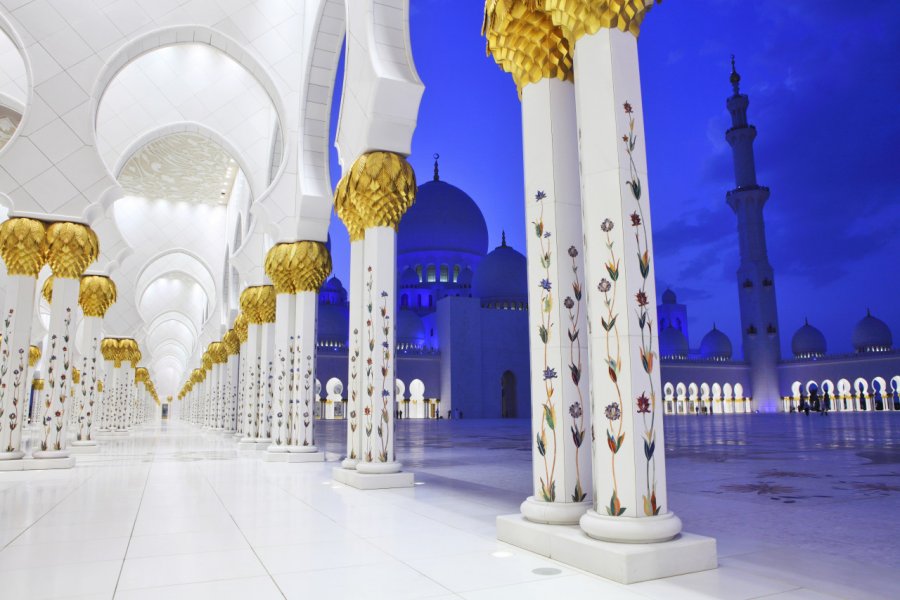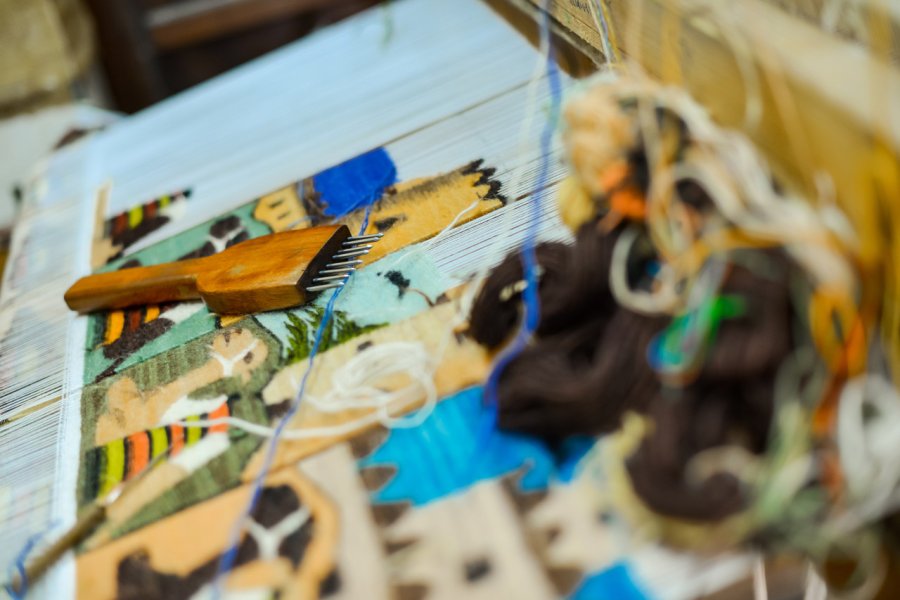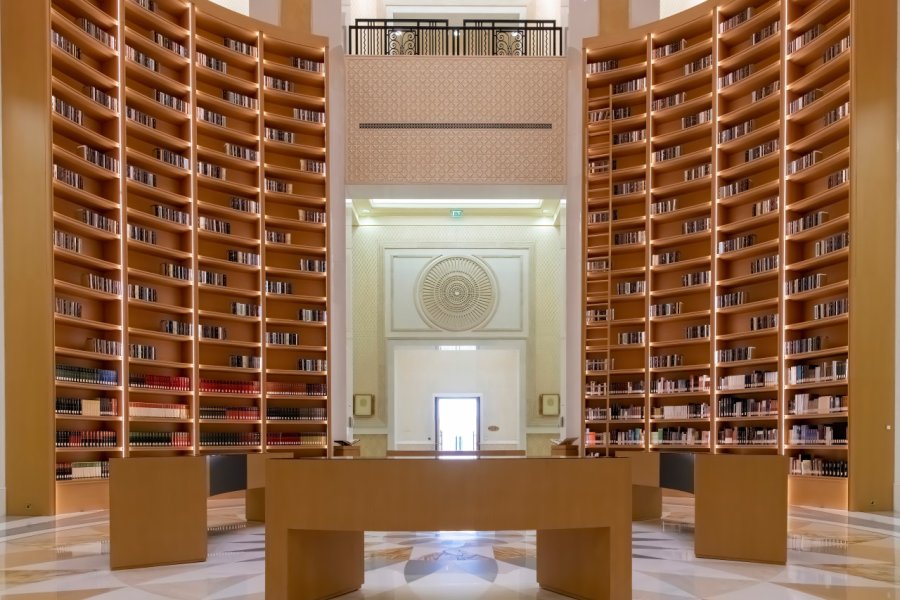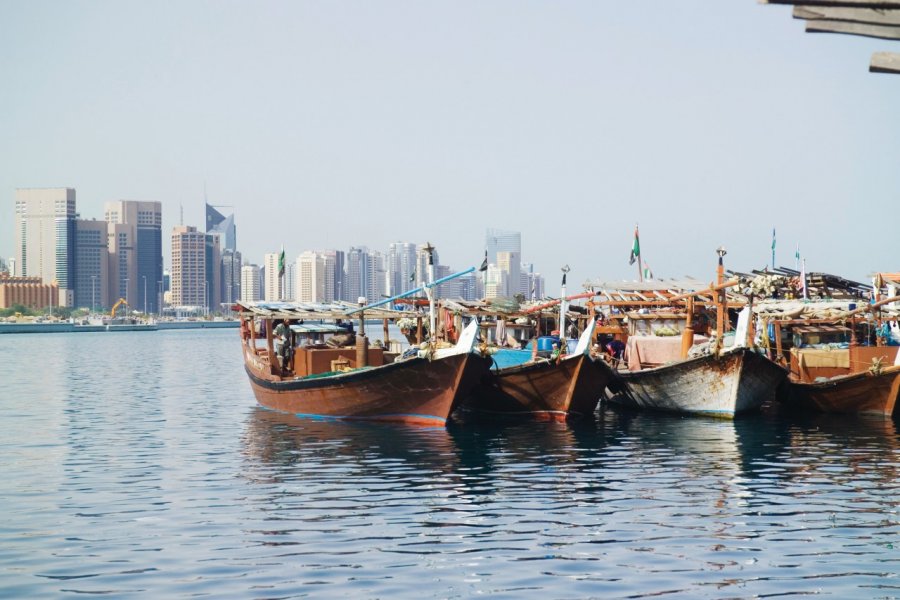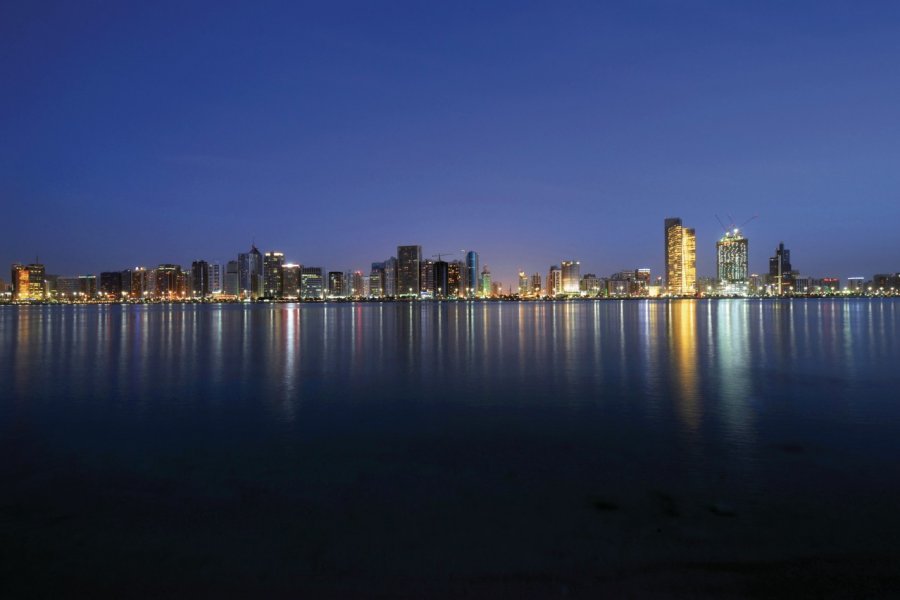Travel guide Île D'Abu Dhabi
This is the city of Zayed! Sheikh Zayed, father of the nation, founder of the United Arab Emirates. His legacy is everywhere: the mosque, the port, the bridge designed by Zaha Hadid and the main artery bear his name. Abu Dhabi is the federal capital and economic engine of the country thanks to its immense oil reserves. It is also the image of cultural heritage, traditions and culture, as exemplified by the Louvre Abu Dhabi nestled in the heart of the cultural district of Saadiyat Island, which will soon be home to three other museums. Formed by a multitude of islands, the turquoise water is everywhere and delights the tourist who moves between the cultural sites, the Grand Mosque of Abu Dhabi and the white sandy expanses of Saadiyat Island. One does not come to Abu Dhabi to party, but rather to relax and unwind by the sea and to understand the extraordinary leap forward this emirate has made in less than 60 years. Abu Dhabi was a small town of houses made of palm branches and 5,000 fishermen in 1950, the poorest of the emirates, unknown and desolate. Wilfred Thesiger describes it admirably in his book The Desert of Deserts in 1947: "A large castle dominated the small ruined town that stretched along the shore. There were some palm trees and, not far from them, a well where we watered our camels. During this time, some Arabs were staring at us with curiosity, wondering who we were. It is easy to see how far this port has come from anonymity to the forefront of the international scene. The Emiratis have transformed their city, which now welcomes millions of tourists every year. They want to promote inter-cultural and inter-religious dialogue with the upcoming opening of the House of Abraham. A mosque, a church and a synagogue as well as a center for religious and inter-cultural education to promote the coexistence of the three religions and which follows the signing of the declaration on brotherhood on February 4, 2019, between the Pope and the Grand Iman of Al-Azhar. The construction of the Indian Mandir temple in the middle of the desert on the road to Dubai is equally spectacular. In 2020, Abu Dhabi signs the normalization of its relations with Israel, a surreal moment for those who have lived in the Emirates for a long time. In 2021, the country celebrated its 50th anniversary, a golden age. In 2023, Abu Dhabi is set to host COP 28. What a journey and what a destiny!
What to see, what to do Île D'Abu Dhabi?
-
Book an activity
-
Customized travel
- Addresses to visit Île D'Abu Dhabi
Weather at the moment
Suggested addresses Île D'Abu Dhabi
Travel Île D'Abu Dhabi
-
Find a hotel
-
Car Rental
-
-5% on travel insurance-15% off travel insurance
-
Find a local agency
Find unique Stay Offers with our Partners
Discover Île D'Abu Dhabi
Abu Dhabi, "the father of the gazelle", the federal capital of the United Arab Emirates, appeared as a settlement in 1793 and remained a provincial town until the early 1960s. In Qasr el Hosn, you'll discover, incredulous, these yellowed photos of a beach planted with a few shacks and haunted by ungainly fishermen. The sight before our eyes today gives full meaning to the word "development". At the beginning of the 20th century, historians agree that Abu Dhabi's population did not exceed 6,000, falling to around 4,000 in the mid-1950s when the pearling industry collapsed. It wasn't until the end of the 1960s, when Sheikh Zayed came to power and the technical and commercial structures of the black gold industry were established, that a real phenomenon of urban sedentarization took place. Today, the island is both modern and a guardian of its cultural heritage.
Pictures and images Île D'Abu Dhabi
The 12 keywords Île D'Abu Dhabi
1. #Abaya and dishdash

These clothes are the visible signs of the Emirati identity. A long black coat for the lady, the abaya is sometimes discreetly decorated with gold threads and embroidery. For men, the dishdash or kandura is a long cotton dress of immaculate white, which is sometimes colored in winter. Mister changes almost 4 times a day.
2. #Brunch
It's an institution in Abu Dhabi on Saturday lunchtimes and a never-ending topic on social networks. Almost every restaurant offers it. Some are more festive, others more family-oriented. Whether it's a non-alcoholic version or an all-you-can-eat version, expatriates dress up and perch on high heels to stroll in front of the pantagruelian buffets.
3. #Camels

They are called camels but in reality they are dromedaries, with one hump. They are an important part of Emirati culture, a "gift of God to the Bedouin", as these desert animals often made life in the desert possible, providing everything from transportation to clothing and even food. Their races are an institution.
4. #Flag

The flag of Abu Dhabi is still sometimes seen today. It is red, with a white square in the upper corner. In fact, this is a relatively new version. Until the late 1950s, Abu Dhabi used an ordinary red flag, at least on land. In 1958, the ruler of Abu Dhabi, Sheikh Shakbut, added a white square.
5. #Falconry

This traditional Emirati sport has been practiced for over 2,000 years with skills passed down from generation to generation. Falconry requires patience and cooperation between the falconer and his bird. It is taught at a very early age to boys who are given a falcon with the mission of training it: "You will be a man my son!"
6. #Iftar
During Ramadan, at sunset, iftar marks the end of the day's fasting. This is when people gather to indulge in parties at home, restaurants or iftar tents across Abu Dhabi. Late night shopping, dining and cultural activities add to the local festivities.
7. #Islam
While Islam is the official religion of the UAE and is widely practiced, the UAE Constitution provides for freedom of religion. Abu Dhabi is tolerant of other religions, with people free to practice their own religions, as long as they do not interfere with Islam. The holy day is Friday.
8. #Ladies' night
Ladies night" is a part of Abu Dhabi's social life. In a nutshell, some bars allow women to drink on sight. Originally it was every Tuesday and it has been so successful that you can find it almost every day of the week. A website allows you to find out when and how to enjoy them: www.timeoutabudhabi.com
9. #Ramadan
Ramadan is the holy month in which Muslims commemorate the revelation of the Holy Quran, the holy book of Islam. It is a time of fasting and Muslims abstain from all food, drink, smoking and impure thoughts or activities between dawn and dusk. At sunset, the fast is broken with the celebration of Iftar.
10. #Shawarma
Whether it's a meal on the go, a good dish or the end of an evening, in Abu Dhabi, a shawarma is the perfect food choice. Who doesn't love succulent meat with garlic sauce, wrapped in Arabic bread with French fries? One of the pleasures of Abu Dhabi is that you can enjoy a shawarma at any time.
11. #Salam Alaikum
This local greeting means "Peace be with you". The usual response is "Wa-Alaikum-Salaam", which means "Peace to you". While it is widely used among Muslims, Emiratis appreciate it when tourists share with them this greeting which is so important in their culture, and which expresses loudly and clearly a true desire for shared peace.
12. #Tolerance
In 2019, Pope Francis came to Abu Dhabi to inaugurate the year of tolerance and to sign the document on human brotherhood with the iman of Al-Azhar. In February 2023, the Abraham House was inaugurated on Saadiyat Island, bringing together a mosque, a synagogue and a church, a symbol of this tolerance between religions.
You are from here, if...
You always speak with respect for the royal family, religion, traditions and culture of the country.
You always speak in "globish" and everyone understands you.
You never stress about a parking space, because there is always a valet.
You don't even drink a small beer if you have to drive.
You get cold when the temperature drops to 25°C.
You're not surprised that schools close when there's a storm.
You forget to lock the car and the door of the house or you leave the bag open all the time and you don't see what the problem is.
You walk into 5-star hotels as if you were in a bistro, as much of Abu Dhabi's social life revolves around these luxury establishments.
You instinctively ask a person's nationality when you first meet them, and you are no longer surprised that you work with at least ten different nationalities in the office.

